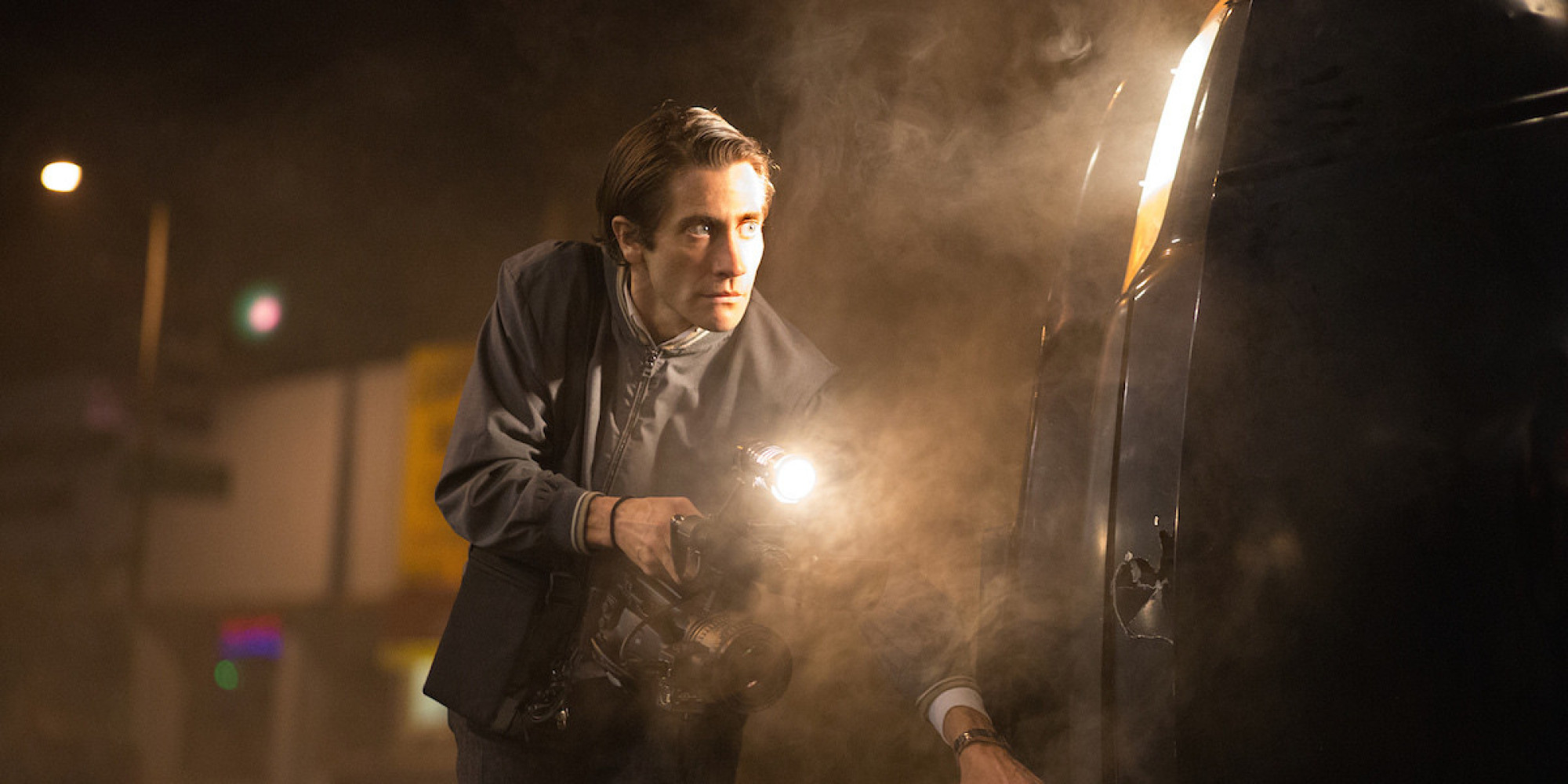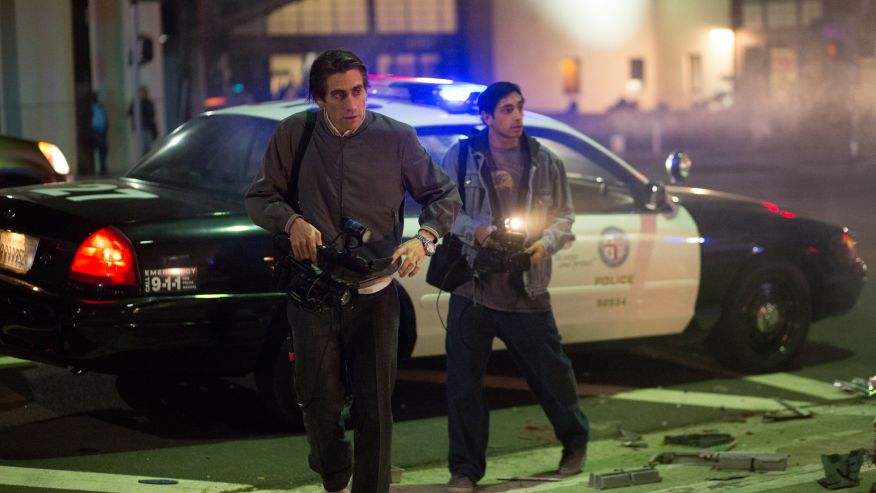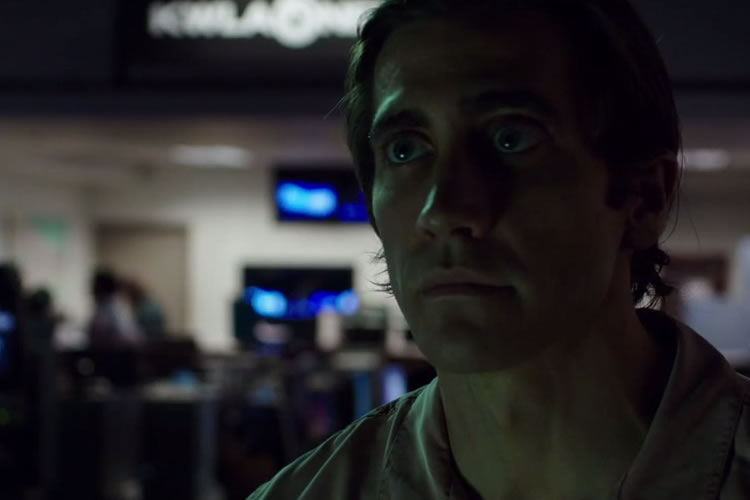Nightcrawler is supposedly about ethics in news journalism. To be more specific, the film is about the lack thereof. It’s allegedly similar to Network, Broadcast News, Ace in the Hole, and any number of films about journalists doing shady things or being forced to do work that goes against everything they believe in. But what Nightcrawler aspires to be is not a film about journalism, but a film about capitalism. It’s not terribly important that Louis Bloom (Jake Gyllenhaal), the film’s protagonist, a slimy, conniving sociopath with sunken raccoon eyes and pale skin, happens to fall into television news footage. Director Dan Gilroy could have situated Louis in a handful of other professions, but there’s no denying that journalism is sexy.
Nightcrawler is not actually about ethics in news journalism. It’s about the ethics of American capitalism. It’s about the rhetoric of business psychology seeping into a Machiavellian mind and secretly corrupting both the real-life and mediated realities of Los Angeles. For this reason, Nightcrawler should be compared to stories that detail the psychology of opportunism and sales, like The Wolf of Wall Street, Barcelona, and Glengarry Glen Ross. If we want to delve into broader psychological territory, Louis’s sociopathic behaviour is more aligned with films like The King of Comedy and Taxi Driver. Nightcrawler is even reminiscent of the reality television satire show “Nathan For You.”
If Nathan Fielder had an evil twin brother who was actually talented in the art of business—preternaturally gifted at it—that man would be Louis Bloom. Both are awkward, unkempt individuals who dress like Mormons. Both attempt to implement business-school principles. Both use wishy-washy business jargon to persuade others to do what they want (throwing in words like “leverage” and “career goals” to seem more intelligent than they actually are). But only one of them is actually good at business. Sadly, that person is the evil, corrupt brother instead of the well-meaning, endearing brother. That fact shouldn’t be surprising given how pop culture tends to represent corporate success.
Nathan Fielder’s ideas are brilliant only insofar as how awful they are, and therein lies the comedic genius of the show. Louis’s ideas could be described as brilliant, but more accurate adjectives would be opportunistic, or evil. He views the value of his business and its growth on a higher level than the well-being of other people. He sees psychological manipulation as a basic device to manipulate people into situations that can guarantee him unprecedented access into obtaining spectacular, sensationalist news coverage. He doesn’t have any problem using other people to get the goods, even if it means putting those people, including his own employees, in fatal danger.
Louis’s yearning for success, based on his duplicity and sociopathic tendencies, is pushed to an extreme that allows the film to make a pretty simplistic argument: in order to get ahead, you need to be an asshole. If you’re crazy, even better. Nightcrawler is not a complicated film, and by default Louis is not a particularly nuanced protagonist. But thanks to his dialogue and Gyllenhaal’s performance, Louis is an undeniably interesting character—mostly because of the way he spins his business rhetoric into conversations. This is not something he learned on the job—like most people do, in an office culture that enables such a pidgin language to become acceptable—but rather, a vernacular he taught himself by reading online courses and books.
Like most fields, business requires both a certain degree of natural talent and a canon of literature that backs up its ideas and foundations. There are areas where one’s natural abilities, like presence, language abilities and confidence, eclipse whatever could be learned from a textbook. The Wolf of Wall Street’s real-life story of Jordan Belfort is such an example. Despite his epic downfall, Belfort is shown to effortlessly bounce back, selling the idea of selling to countless, oblivious wannabe professionals.
The language of business, as presented on paper, reads much less skeevy. It’s lofty, ambitious, even noble. In Barcelona, an equally brainwashed Ted explains such a concept. “Franklin, Emerson, Carnegie and Bettger were our philosophers,” he boasts over voiceover. He delights in enlightening everyone about the benevolence of his profession. “I don’t consider high-pressure sales sales at all. It’s a form of fraud. In true sales, you provide a real and constructive service; help people improve their lives or make companies more efficient.” In that film, Ted is in a for a surprise when his company is restructured, finding out that business isn’t as romantic as he’d imagined.
In Nightcrawler, Louis’s character strips the abstract, visionary rhetoric of business-speak with his sleazy nature. His articulation of this pidgin is not cultivated from a work environment. Rather, it’s uttered like he’s memorized specific phrases from a book (the fact that he’s an autodidact makes his “career goals” that much more psychotic). “I think being clear with your objectives is more important than trying to present ideas in a non-confrontational manner,” he says in a creepily earnest manner to Nina, the news producer at the station where he sells his film. She initially sees right through this talk, but becomes increasingly mesmerized by his rhetoric as his “leveraging” position increases.
But initially, Louis’s strategic, rehearsed speeches are at odds with his persona as a con man, and it takes him a while to succeed at combining these approaches. Most of the film’s early, periphery characters aren’t fooled by his slimy attempts to impress, like the security guard whose badge Louis takes a faux-friendly interest in, the construction manager he brazenly sells stolen goods to while asking for a job, and a pawn-shop owner who doesn’t buy Louis’s story that he is a professional cyclist.
There is something off-putting about Louis’s demeanor—perhaps it’s the fact that he actually looks like he could be a serial killer—and his tenacity and obsessive desire to impress people is Rupert Pupkin-like. He improves his performance as a professional shark, evolving his tactics while others, shown in contrast, remain behind. Rick, the poor schmuck whom he hires for $30 a night as his assistant, deals in colloquialisms, swears, and constant apologies for his amateur mistakes. Joe, Louis’s competition, ends with every sentence with “brah.” While everyone seems to see through Louis, they forgive him for his appearance and conniving qualities because he finally has something of substance to sell.
“What makes a job desirable isn’t just the dollar amount attached to it, Rick,” he tells his employee in the midst of socially engineering a potentially threatening stand-off between armed criminals and the police. “You’re on the ground floor of a growing business. Your reward is a career.”
“Fuck that. You’re talking about some fucked up shit and you’re asking me, you just expect me to be part of it,” is Rick’s response. Given the illegality and immorality of Louis’s proposition and the danger he’s creating for everyone involved, Rick’s response is pretty understandable.
It takes a certain type of narrative throes to establish the sheer absurdity of Louis’s manipulation. Nightcrawler ends with his elaborate scheme turning into a train wreck, with dozens of dead bystanders and cops, a disastrous failed car chase, and, naturally, fantastic news footage. The end result of this bloodbath is the continued success of Louis’s business, Video Production News, and it all further underscores the ridiculousness of Louis’s verbal grandiosity, how success all rings false in the name of danger. More so than Office Space or Glengarry Glen Ross—in which business-speak is practiced in actual office environments—Nightcrawler reveals the folly of such rhetoric by employing it in the seedy underbelly of Los Angeles, where the nightcrawlers roam, their eyes glistening from streetlight illumination, as they await their next opportunity to capture horror with bated breath.



